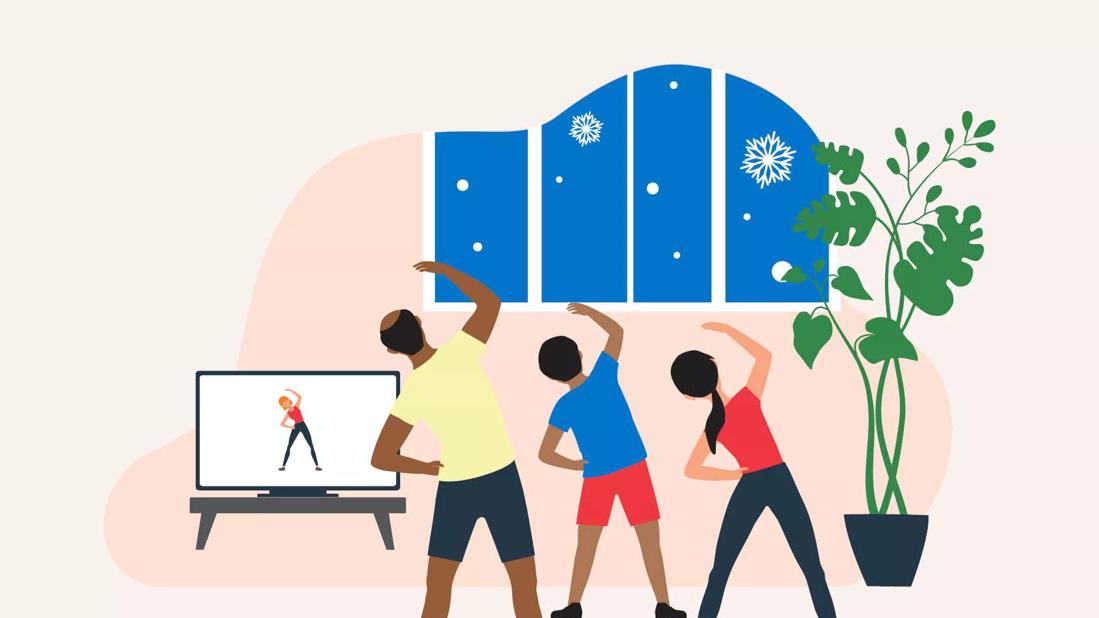Step back from social media, set boundaries and spot the symptoms of SAD

Image content: This image is available to view online.
View image online (https://assets.clevelandclinic.org/transform/a8505f48-fe8e-4795-bee1-75ee02e5d9ac/Winter-Blues-1294230721-770x533-1_jpg)
Family working out inside the house while it's snowing outside.
Cold spell got you feeling in a funk? Or maybe it’s all the snow that makes you want to hibernate. When the weather outside gets frightful and the sun sets at the strike of 5 p.m., it’s not uncommon to feel less-than-sunny.
Advertisement
Cleveland Clinic is a non-profit academic medical center. Advertising on our site helps support our mission. We do not endorse non-Cleveland Clinic products or services. Policy
We’re here to help make sense of how Jack Frost affects our moods and offer up some tips for people who struggle with the chilly season.

Image content: This image is available to view online.
View image online (https://assets.clevelandclinic.org/transform/b477ba8c-9894-46bf-9f83-c0d6d0110912/SAD-901829416-650x450-650x428_jpg)
Blues or SAD?
If you find that the winter months bring on persistent symptoms of depression, it may be that you’re living with seasonal affective disorder (SAD). People with SAD may feel anxious or irritated for prolonged periods, timed around the winter months. They’re also likely to withdraw from social situations and have trouble concentrating.
Unlike the mild, come-and-go winter blues, SAD is a major depressive disorder that needs treatment. Spot the difference between SAD and the winter blues, and talk with a healthcare provider if your down mood lasts more than a few weeks.

Image content: This image is available to view online.
View image online (https://assets.clevelandclinic.org/transform/7bee9f0d-17c9-4523-98c7-d094501f8f80/StressDuringHolidays-1177096652-770x533-1-650x428_jpg)
Or maybe it’s just the holidays
While the holiday season can be a time for reflection, joy and spending time with family, it can also be a time of stress and sadness. Things get busy. You’re under pressure trying to get the perfect gift for everyone on your list. And, let’s face it … all that family time can sometimes just be too much.
If holiday stress has you less cheery and more bear-y, psychologist Dawn Potter, PsyD, suggests setting boundaries for yourself and limiting your social media use. There’s nothing that will put needless extra pressure on you quite like trying to measure up to someone else’s Instagram-curated version of the holidays.
Advertisement

Image content: This image is available to view online.
View image online (https://assets.clevelandclinic.org/transform/59f399f6-68ce-4723-aed6-5cafa3ca2d06/LightTherapySAD-166828091-770x533-1-650x428_jpg)
Light up your life
Sunlight plays a big role in regulating our mood and our sleep-wake cycles. So, when the winter months bring on gray skies, a little boost of sunshine can do our bodies and our minds a world of good. Psychologist Adam Borland, PsyD, says light therapy can help people living with SAD or anyone who could use a bit of sunshine-like light in the winter.

Image content: This image is available to view online.
View image online (https://assets.clevelandclinic.org/transform/6e4feae4-7196-4999-86d3-8ed7bf337f04/exerciseBikeHappy-1002514448-770x533-1-650x428_jpg)
Get moving
One of the best ways to fight off the winter blues is to get yourself moving. That’s right. Integrative medicine physician Irina Todorov, MD, says exercise really does improve your mood.
You don’t have to forgo your run in the cold months, but you might want to take a few extra precautions, like making sure your shoes are up to the challenge and taking extra care to keep your muscles stretched. If an indoor workout is more up your alley, you can start assembling a home gym with just a few key pieces of equipment (think a yoga ball and a jump rope). Or find a yoga class that works for you. Getting in the habit of exercise can help lift your spirits and do your body a world of good.

Image content: This image is available to view online.
View image online (https://assets.clevelandclinic.org/transform/c7765823-e15b-4383-bb37-2e54e3199ce5/vegetableSoupLeeks-86056937-770x533-1_jpg)
Food to lift your mood
Many good-for-you foods are also natural mood boosters. That’s because there are some foods that help release chemicals in your brain that are responsible for feelings like calmness, happiness and alertness.
What should you eat to help fight the winter blues? Cleveland Clinic experts recommend warm oatmeal with sliced banana. Or some cozy chicken vegetable soup. Or even an apple with nut butter.
Advertisement

Delivered every Tuesday!
Sign up for our Health Essentials emails for expert guidance on nutrition, fitness, sleep, skin care and more
Learn more about our editorial process.
Advertisement
Connecting with others, going for a walk or focusing on sleep quality can help more than you might realize
Like being your own best friend in times of trouble, self-love is an act of self-preservation
It’s not about embracing your dark side — it’s about showing up for yourself
Like a boring ol’ grey rock, the goal is to be unresponsive and uninteresting to dissuade a harmful situation
Narcissistic personality disorder is a mental health condition, not an insult
Whether this behavior is abusive depends on the person doing it and their motivation
You may not always notice it, but your mental health has just as big of an impact on your well-being as your physical health
This mindful practice is designed to give you mental and physical relaxation
Type 2 diabetes isn’t inevitable with these dietary changes
Applying a hot or cold compress can help with pain
Pump up your iron intake with foods like tuna, tofu and turkey